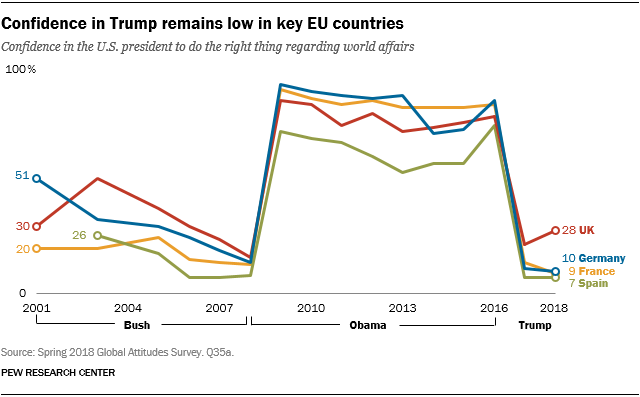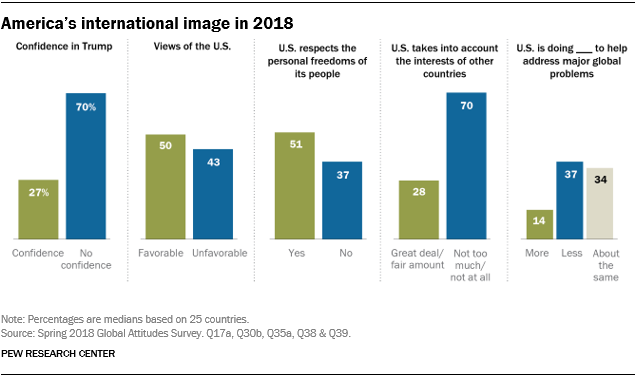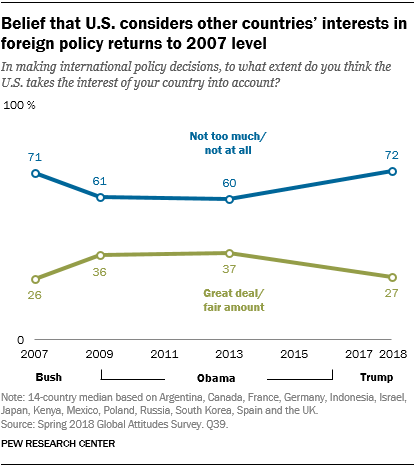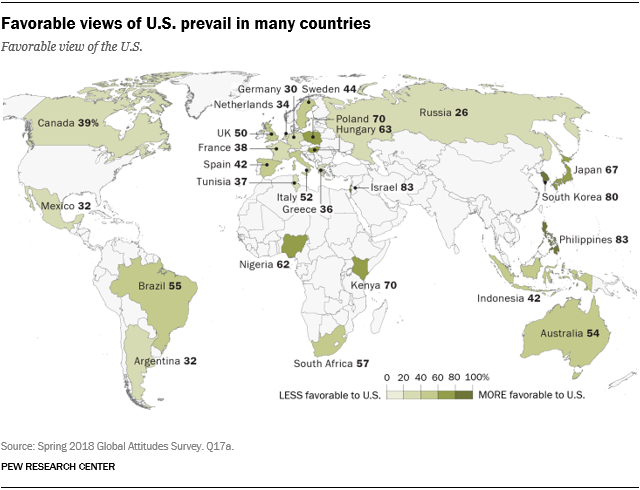Canada and the U.S. have enjoyed a very close relationship. However, the polarization caused by President Trump has stressed this relationship to the detriment of both countries.
It goes beyond personal animosity between the nation's leaders, something that prevailed during the Johnson and Nixon eras and spilled over into Canada's domestic affairs.
A more fundamental change is underway - a rather amazing shift in just two years. The President has come to symbolize the differences between Canada and the U.S. in a number of arenas: guns; environmental protection; racial and ethnic harmony; economic disparity; approaches to diplomacy, and so on.
The irony of Trump's imposition of tariffs on steel and aluminium in the name of national security on his closest military ally, Canada, has set the groundwork for pushback. In Canada, the political calculus is such that the Canadian Government feels confident in public support for the measure described below.
Canada Considers New Retaliatory Tariffs on U.S. Agricultural Products
“When the U.S. imposed (steel and aluminum) tariffs, we said we could put in corresponding tariffs – dollar for dollar – in retaliation of unjustified and illegal tariffs,” says MacNaughton. “Our position is that the tariffs are unjustified and illegal and should go.”
U.S. agricultural products on which Canada may add tariffs include apples, pork, and ethanol. During a 45-day consultation period, Canada would determine which would have the least impact on Canadian consumers and the most impact on the U.S.
There is a growing gulf between Canada and the U.S. - something that the Trump administration has encouraged, if unwittingly.
Canadians are seeing the whole world through an anti-American lens
For the first time since pollsters started measuring such attitudes almost 40 years ago, a majority of Canadians now hold an overall unfavourable view of the United States. As of last year, only 44 per cent of Canadians said they hold a positive view of their neighbouring country, the lowest ranking ever.
It is not a subtle drift – Canadians were overwhelmingly positive about the United States as recently as 2016, until Donald Trump’s inauguration put a majority into the anti-American column. The proportion of Canadians who see the United States as “a negative force in today’s world” is now almost 6 in 10, a 12-per-cent rise over 2008, making America by far the most negative country in the eyes of Canadians (even North Korea comes a distant second, at 46 per cent).
What is apparent, reading the rest of this survey’s results, is how much this antipathy to Mr. Trump has also shaped Canadians’ views of other countries, of their opinions on economics and trade and immigration, of their leisure-time activities, of their own government’s priorities.
Here are a few extracts from the aforementioned report, Canada's World Survey:
Canadians view of their country as a trading nation has
strengthened over the past decade. There is a strong and
growing consensus that international trade is important for
Canadian jobs and the quality of life in the country; close to
three-quarters of the population now hold this view. Close
to two-thirds believe NAFTA has helped rather than hurt the
Canadian economy, a sentiment that has also become more
widespread since 2008.
More than six in ten (63%) Canadians believe NAFTA
has helped the Canadian economy, over three times the
proportion (18%) who say it has been hurtful. The positive
view has grown significantly since 2011 (up 13 points) and
is now at its highest level since Environics Research starting
asking this question in 1995.
When asked which countries stand out as being a negative force in the world, Canadians once again put the United States squarely at the top of the list. Next most apt to be named include North Korea and Russia. Just over one in ten identify Iran, China, Iraq, and Saudi Arabia.
The positioning of “bad” countries has shifted over the past
decade. The United States is more firmly entrenched at the
top of the list (up 6 points from 2008). More significantly,
North Korea moved five spots, from seventh to second, and
Russia jumped from eighth to third.
Amidst the drama and chaos that has characterized the first year of
the Trump Presidency, one that delivered a major jolt to that
country’s political and cultural fabric, Canadians’ views of
their neighbour to the south have taken a negative turn. Less
than half of the Canadian population now holds a very (12%)
or somewhat (35%) positive overall opinion of the United
States; this is down substantially from 2012 during the lead
up to Barack Obama’s re-election victory. Although slightly
more positive than in April 2017, Canadians’ overall views of
the U.S. remain at their lowest point since Environics began
measuring it in 1982.
Two-thirds of Canadians have travelled to the U.S. in the past
five years, but one in four reports changing or reconsidering
plans for future visits because of the current political climate.
Canadians’ overall opinion of the United States has worsened
significantly since Donald Trump became the President, but
a majority believe US-style populism is unlikely to come to Canada.
Interesting times.
This shift is taking place throughout much of the world, including America's closest allies. However, it would be a mistake to ignore the nuances of the relationship of the U.S. with the rest of the world. No better is that illustrated than in a recent Pew Research Center report:
How the world views the U.S. and its president in 9 charts




The implications of this shift are concerning, especially given the rather muscular entry of China on to the world stage in recent decades. Ditto for Trump's apparent blindness to Russia's recent interference with elections and its virtual annexation of the Crimea. Perhaps the underlying reasons for this stance will eventually come to light.
How will this chaotic presidency affect America's standing and the world economic and political order?
For example, the preparedness of the U.S. to deal with unanticipated geopolitical tsunamis appears to be diminished: a bureaucracy under assault by an erratic and capricious president; a constantly changing inner circle populated by sycophants without a strong moral compass; an apparent reduction of resources to invest in projecting America's interests due to tax cuts and an ever-increasing national debt.
The country is divided. The extreme partisanship of the political structure has seemingly hobbled the ability of the country to work in its own best interests. Fortunately things have not deteriorated to the sorry state of the UK birthed by David Cameron's breathtakingly stupid and cynical gambit to put Brexit on the table for strictly partisan political purposes.
This financial navigator is starting a storm watch and making preparations to batten down the hatches and head to a safe haven.
It goes beyond personal animosity between the nation's leaders, something that prevailed during the Johnson and Nixon eras and spilled over into Canada's domestic affairs.
A more fundamental change is underway - a rather amazing shift in just two years. The President has come to symbolize the differences between Canada and the U.S. in a number of arenas: guns; environmental protection; racial and ethnic harmony; economic disparity; approaches to diplomacy, and so on.
The irony of Trump's imposition of tariffs on steel and aluminium in the name of national security on his closest military ally, Canada, has set the groundwork for pushback. In Canada, the political calculus is such that the Canadian Government feels confident in public support for the measure described below.
Canada Considers New Retaliatory Tariffs on U.S. Agricultural Products
“When the U.S. imposed (steel and aluminum) tariffs, we said we could put in corresponding tariffs – dollar for dollar – in retaliation of unjustified and illegal tariffs,” says MacNaughton. “Our position is that the tariffs are unjustified and illegal and should go.”
U.S. agricultural products on which Canada may add tariffs include apples, pork, and ethanol. During a 45-day consultation period, Canada would determine which would have the least impact on Canadian consumers and the most impact on the U.S.
--------------------------
There is a growing gulf between Canada and the U.S. - something that the Trump administration has encouraged, if unwittingly.
Canadians are seeing the whole world through an anti-American lens
For the first time since pollsters started measuring such attitudes almost 40 years ago, a majority of Canadians now hold an overall unfavourable view of the United States. As of last year, only 44 per cent of Canadians said they hold a positive view of their neighbouring country, the lowest ranking ever.
It is not a subtle drift – Canadians were overwhelmingly positive about the United States as recently as 2016, until Donald Trump’s inauguration put a majority into the anti-American column. The proportion of Canadians who see the United States as “a negative force in today’s world” is now almost 6 in 10, a 12-per-cent rise over 2008, making America by far the most negative country in the eyes of Canadians (even North Korea comes a distant second, at 46 per cent).
What is apparent, reading the rest of this survey’s results, is how much this antipathy to Mr. Trump has also shaped Canadians’ views of other countries, of their opinions on economics and trade and immigration, of their leisure-time activities, of their own government’s priorities.
Here are a few extracts from the aforementioned report, Canada's World Survey:
Canadians view of their country as a trading nation has
strengthened over the past decade. There is a strong and
growing consensus that international trade is important for
Canadian jobs and the quality of life in the country; close to
three-quarters of the population now hold this view. Close
to two-thirds believe NAFTA has helped rather than hurt the
Canadian economy, a sentiment that has also become more
widespread since 2008.
More than six in ten (63%) Canadians believe NAFTA
has helped the Canadian economy, over three times the
proportion (18%) who say it has been hurtful. The positive
view has grown significantly since 2011 (up 13 points) and
is now at its highest level since Environics Research starting
asking this question in 1995.
When asked which countries stand out as being a negative force in the world, Canadians once again put the United States squarely at the top of the list. Next most apt to be named include North Korea and Russia. Just over one in ten identify Iran, China, Iraq, and Saudi Arabia.
The positioning of “bad” countries has shifted over the past
decade. The United States is more firmly entrenched at the
top of the list (up 6 points from 2008). More significantly,
North Korea moved five spots, from seventh to second, and
Russia jumped from eighth to third.
Amidst the drama and chaos that has characterized the first year of
the Trump Presidency, one that delivered a major jolt to that
country’s political and cultural fabric, Canadians’ views of
their neighbour to the south have taken a negative turn. Less
than half of the Canadian population now holds a very (12%)
or somewhat (35%) positive overall opinion of the United
States; this is down substantially from 2012 during the lead
up to Barack Obama’s re-election victory. Although slightly
more positive than in April 2017, Canadians’ overall views of
the U.S. remain at their lowest point since Environics began
measuring it in 1982.
Two-thirds of Canadians have travelled to the U.S. in the past
five years, but one in four reports changing or reconsidering
plans for future visits because of the current political climate.
Canadians’ overall opinion of the United States has worsened
significantly since Donald Trump became the President, but
a majority believe US-style populism is unlikely to come to Canada.
Interesting times.
This shift is taking place throughout much of the world, including America's closest allies. However, it would be a mistake to ignore the nuances of the relationship of the U.S. with the rest of the world. No better is that illustrated than in a recent Pew Research Center report:
How the world views the U.S. and its president in 9 charts




The implications of this shift are concerning, especially given the rather muscular entry of China on to the world stage in recent decades. Ditto for Trump's apparent blindness to Russia's recent interference with elections and its virtual annexation of the Crimea. Perhaps the underlying reasons for this stance will eventually come to light.
How will this chaotic presidency affect America's standing and the world economic and political order?
For example, the preparedness of the U.S. to deal with unanticipated geopolitical tsunamis appears to be diminished: a bureaucracy under assault by an erratic and capricious president; a constantly changing inner circle populated by sycophants without a strong moral compass; an apparent reduction of resources to invest in projecting America's interests due to tax cuts and an ever-increasing national debt.
The country is divided. The extreme partisanship of the political structure has seemingly hobbled the ability of the country to work in its own best interests. Fortunately things have not deteriorated to the sorry state of the UK birthed by David Cameron's breathtakingly stupid and cynical gambit to put Brexit on the table for strictly partisan political purposes.
This financial navigator is starting a storm watch and making preparations to batten down the hatches and head to a safe haven.
No comments:
Post a Comment